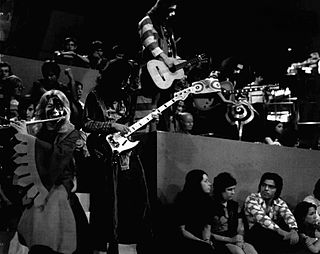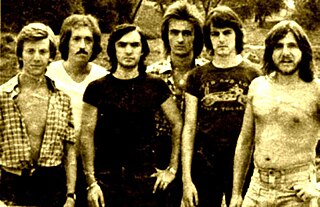Related Research Articles
Italian rock is a form of rock music produced primarily in Italy. The music genre has roots in the country as it spread in the early 1960s from the United States with the earliest versions of rock and roll during this period being cover versions or interpretative covers of already existing songs.

The Milan Conservatory is a college of music in Milan, Italy.
RDM may stand for:

Premiata Forneria Marconi (PFM) is an Italian progressive rock band founded in 1970 and which continues to the present day. They were the first Italian group to have success internationally. The group recorded five albums with English lyrics between 1973 and 1977. During this period they entered both the British and American charts. They also had several successful European and American tours, playing at the popular Reading Festival in England and on a very popular national television program in the United States.
Cervello ("Brain") is the name of an Italian progressive rock band of the early 1970s.

Luis Enríquez Bacalov was an Argentine-Italian film composer who learned music from Enrique Barenboim, father of Daniel Barenboim the conductor of the Berlin, and Chicago orchestras, and also Berta Sujovolsky. Bringing his talent into society he ventured into music for the cinema, and composed scores for Spaghetti Western films. In the early 1970s, he collaborated with Italian progressive rock bands. Bacalov was nominated twice for the Academy Award for Best Original Score, winning it in 1996 for Il Postino. Bacalov composed significant works for chorus and orchestra. Before his death, he was the artistic director of the Orchestra della Magna Grecia in Taranto, Italy.

Banco del Mutuo Soccorso is an Italian rock band. A popular progressive rock band in the 1970s, they continued making music in the 1980s and 1990s. Recently, they were still active, playing live in 2001 and 2008 at NEARfest. Their charismatic frontman, Francesco Di Giacomo, died in 2014.

Le Orme is an Italian progressive rock band formed in 1966 in Marghera, a frazione of Venice. The band was one of the major groups of the Italian progressive rock scene in the 1970s. They are one of few Italian rock bands to have success outside their own country, having played concerts across North America and Europe, and releasing an album in English at the height of their success.

Il Balletto di Bronzo is an Italian progressive rock band from Naples. The band was initially formed as the I Battitori Selvaggi, and played Nato bases in Italy. Early members included Rafaele Cascone, a progressive guitarist and Freddy Cannon on drums. Cannon would later become a very successful record company executive with EMI, Carrere, PWL and join BMI as a senior executive in 1994. They changed their name to Il Balletto di Bronzo in 1969 and released two singles, Neve Calda / Comincio 'Per Gioco (1969) and Si, Mama Mama / Meditazione (1970). The albums Sirio 2222 and Ys followed, before they before disbanded in 1973.
Locanda delle Fate is an Italian progressive rock band from the end of the Italian progressive rock movement.

Osanna are an Italian progressive rock band.

The Badia a Settimo or Abbazia dei Santi Salvatore e Lorenzo a Settimo is a Cluniac Benedictine abbey in the comune of Scandicci, near Florence in Tuscany, Italy. It was founded in 1004.

Maxophone are an Italian progressive rock band formed in Milan in 1973. They released one self-titled album in 1975. The group was one of the few rock artists signed by the Produttori Associati record label, which focused mostly on film soundtracks and jazz. Maxophone have since acquired a minor cult following that has endured for over three decades, long after their short career had ended.

Storia di un minuto is the first album of the Italian progressive rock band Premiata Forneria Marconi. It was recorded in Milan and released by the Numero Uno division of RCA Records in Italy. The album topped the Italian album charts after one week from the release – the first time occurrence in the Italian charts up until then.
De De Lind was a short-lived Italian progressive rock band active in the early 1970s. The band only released one album and four singles over the five years of its existence.
Nova was an Italian progressive rock band that was formed in 1975 from members of the bands Osanna and Cervello. Based in London for most of their career, they released four albums that were influenced by the 1970s jazz fusion styles of bands such as Mahavishnu Orchestra, Weather Report, and Return to Forever.

QT8 is a district ("quartiere") of Milan, Italy, part of the Zone 8 administrative division of the city. The name formally stands for Quartiere Triennale 8, but the district is also simply referred to as QT8.
Irma Records is an Italian record label founded in Bologna in 1989. It releases alternative acoustic lounge and dance music. It currently has offices in both Bologna, Italy and Tokyo, Japan.
Gloria Banditelli is an Italian mezzo-soprano. She debuted in La Cenerentola in Spoleto in 1979. She is well known both for late-classical early-bel canto era roles of Rossini, Cimarosa and Paisiello, and also baroque opera, such as Monteverdi and Cavalli.
Piero Ciampi was an Italian singer-songwriter.
References
- ↑ "Il Rovescio della Medaglia".
- ↑ "Archived copy". Archived from the original on 2013-07-08. Retrieved 2013-07-08.CS1 maint: archived copy as title (link)
- ↑ The Italian-language version features Johann Sebastian Bach on the cover of the LP and CD. The album's full title is Contaminazione di alcune idee di certi preludi e fughe del Clavicembalo ben temperato di J. S. Bach (English: Contamination of some ideas from certain preludes and fugues from The Well-Tempered Clavier of J. S. Bach).